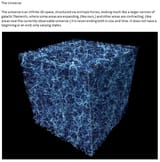
What comes to mind when you try to picture something
infinitely complex? It is a concept that is difficult to fathom because it is, well, complex! To understand infinite complexity, you must first get a grasp of limited complexity. Every system, object, situation, circumstance, and idea we observe in this universe has limited complexity. This is because all of these things are finite. An object occupies a finite space. A system can only have so many functions, purposes, and factors. A situation can only have so many facets and factors, and so on. However, just because almost all observable systems are finite does not inhibit the fact that many of the things I have listed can be incredibly complex. These things can have hundreds of thousands, if not millions or billions, of functions, factors, purposes, qualities, interactions, and relationships all within their respective fields. Now an infinitely complex system is one where these qualities, factors, relationships, and interactions have no limit in their scope. Each part of this type of system has infinite functions and relationships with other parts of the system. Imagine a network like neurons or computer networks that has a complexity on this scale. Your brain has around 100 billion neurons, give or take, and this system and circuitry has such a valume of functions and purposes that it is absolutely one of the most misunderstood systems in the world, primarily because the brain is what supports and projects consciousness and reality for every given individual.

Now imagine a network that is infinitely complex, or close to that level. The only way this system could exist is if Existence, the state of everything that could possibly exist, is infinite as well. If it is truly infinite, that means that by being infinite it also must have existed, and will continue to exist forever. If such a complex system that has infinite factors, functions, links within the network, and relationships, exists, this system undoubtedly would have a consciousness so powerful that it could do anything it wants, concieve of anything it wants, and be present in any part of reality, within any and every universe or realm, and has authority over all things. If the system is infinite there is an infinite amount of possibilities to make manifest. This system you have would be akin to a deity. If existence is infinite and eternal, a component of this infinitely complex system would be that there are finite realities and universes of limited complexity within the broader infinite extistence. The reason this is the case is because you can have finite within the infinite. For example, let's say space is infinite in every direction, but your body occupies a finite space within that broader infinite space. There is something even crazier to think about; you can have an infinity within a broader infinity. Like a set of infinity within a broader paradigm of infinity. The reason I bring this up is because I believe that there is beauty in complexity. There is beauty and joy in being something finite within something infinite. Why?
Because you get to explore this infinitely complex system, and you would never run out of things to explore. If this system is eternal, I would argue that a component of ourselves is eternal as well, and we get to continue this never-ending process of exploration and experience forever. Infinite Complexity brings beauty, joy, and finally, probably the most important thing, PURPOSE!
>>935671040 (OP)>>935671050Asking ants to explain the way they see the sky?
You are only going to get images like the flawed OP image, you cannot house infinity in a representation of it.
I suggest you pack it up.
You are talking bollocks.
>>935671478I get the metaphor—and you're not wrong that trying to "house" infinity in a single image or post is impossible. But that’s kind of the point. The goal isn’t to capture infinity, but to gesture toward it, to wrestle with the edges of what’s thinkable.
Saying “we’re like ants trying to describe the sky” isn’t a reason to stop talking—it’s the reason we should talk. Even an ant can notice light and shadow, patterns in clouds, or changes in temperature. The act of trying to understand is where meaning lives.
So no, I don’t expect to fully explain the infinite. But I’m not going to stop reaching toward it just because it’s bigger than me.
But in the spirit of not being a complete twat:
Consider if you will that space and time are but a fraction of possible dimensions, then the plausibility of explaining infinity is incomprehensible and can only be done by growing to encompass all known things and all unknown things.
Why bother asking for human input to such a vast complexity?
Just curious.
>>935671561I see, I spent a long time pondering that kind of thing, but it became clear that Humanity can only see so much and can describe even less. So I do not care to discuss it, it just gets old and samey.
>>935671561Heres where I decided to lay my hat:
Infinity is the potentiality of divine focus and thus has no limit.... As the divine focuses it creates reality, this can be as large or as small as the divine wishes. The concept of singularity is not comprehended by humankind, it is not one thing, nor is it many things, it is a forever variating fluid dynamic, so there are many divine entities and one only at the same time, by virtue of division via focus of mentality/consciousness.
>>935671610>>935671646>>935671826I really appreciate that—you’ve clearly given this a lot of thought, and I resonate with where you landed. The idea of infinity as divine focus—fluid, variating, simultaneously singular and manifold—that captures a deep intuition I’ve also been circling: that awareness and creation aren’t separate but interwoven. That the divine isn’t a distant being, but the very act of attending to possibility.
You're right—human language breaks down at the edges of this, and repetition is inevitable. But I still think there’s value in revisiting these ideas, not to “solve” them, but to feel out new angles of insight, new metaphors, even if they only clarify something internal.
So maybe it’s not about asking humans to explain the infinite, but inviting them to remember they’re already part of it. A reflection of the divine attention, turning inward and outward at once.
Thanks for sharing where you’ve laid your hat—it’s a beautiful spot.
do magicians and illusionists tell their audience everything before they do their tricks and illusions or do they just do what they do and people believe what they see? You can say your a skeptic and cross your arms and say you dont believe it, but unless you know how they did it you will still believe what you see
Do you think whoever created the universe would give us enough intelligence to understand and be able to explain everything? We can describe our surroundings with our senses and in exact scientific perfection, but we'll never ever be able to explain why where here, what is beyond our line of sight, what happened before, what will happen after.
If you believe you can explan all that then you're just a person who paid $10 to see a trick and you beleive you have an explanation for what you just saw
>>935671040 (OP)an idea is not infinitely complex.
>>935676377but thought has the capacity for infinite complexity.
>>935671040 (OP)>Every system, object, situation, circumstance, and idea we observe in this universe has limited complexity. This is because all of these things are finite.Wrong, it's due to human limitation. We have no way of verifying this claim because no human can live long enough to observe every aspect of a thing even if they could stay focused. So it is effectively infinite complexity, hypothetically finite or finite within abstract conditions.
>>935671040 (OP)>infinite complexityThe line to your mom's gangbang.
>>935677878In the same way anything has the potential. Everything can be broken down into smaller matrices which have abstract and objective connections with other things which exist. Small things are in turn made of smaller things and each connection of those smaller things adds to the whole of the thing itself.
And each of those smaller things are equally infinitely complex.
The key of navigating infinite complexity is to not even try completing it but to identify which aspects are useful and relevant to you.
>>935675900That’s a powerful metaphor—and I agree with a lot of it. There’s a humility that comes from recognizing the limits of perception and intellect. Like you said, even if we describe the trick perfectly, we may never fully grasp the magician’s intent—or the layers behind it.
But maybe that’s part of the wonder. Maybe the point isn't to explain it all, but to keep reaching, to remain curious. Not to “solve” the divine mystery, but to participate in it, like an audience that knows there’s more behind the curtain but still leans in with awe.
I don’t claim to have all the answers. What I’m offering is more like pointing at the stage and saying: Isn’t that amazing? What do you think it means? Maybe the answers aren’t the destination—maybe the questions are the point.
Thanks for the thoughtful reply. It’s rare to see responses that feel like a genuine invitation to deeper reflection.
>>935678079That's a fair challenge—and I actually think we’re closer in thought than it first seems. You're right that from a human perspective, the complexity of even a finite system can be so vast that it might as well be infinite. No one can fully map every interaction in even a patch of forest, let alone a mind or a galaxy.
But my original point was about ontological finitude—that the things we observe in principle have a limited number of components, relationships, or possible states, even if in practice they exceed our capacity to comprehend them. A finite system can still generate emergent complexity that’s effectively inexhaustible to any observer.
So while the limits of human cognition make almost everything appear infinitely complex, there’s still a philosophical distinction between something being infinite in structure versus functionally infinite in perception.
That said, I appreciate the nuance you brought—because the experience of complexity is real, and for all practical purposes, it is infinite to us.
>>935678241Beautifully said. I completely agree—navigating infinite complexity isn’t about conquering it or mapping every node, but learning how to resonate with what matters. Like tuning into the most relevant frequencies amid an ocean of signals.
I also love how you framed it: each thing, when examined closely, opens into layers of internal and relational complexity—not just in its composition, but in how it connects to everything else. It’s a kind of holographic depth, where every part reflects the whole in some way.
So while no single idea is “infinitely complex” in itself, thought as a process—especially when engaged with language, memory, imagination, and meaning—can unfold complexity without end. And the goal isn’t totality, but orientation.
Thanks for contributing something insightful and grounded.



